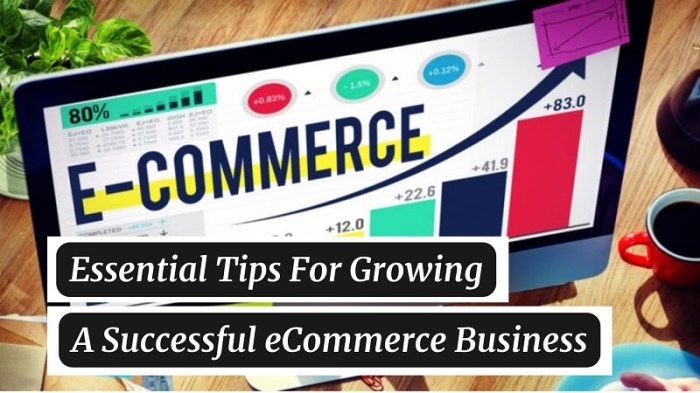Kicking off with E-commerce Growth Tips, this is your ultimate guide to taking your online business to the next level. From strategies to data analytics, we’ve got you covered with everything you need to know.
Learn how to leverage data analytics, enhance customer experience, and boost sales like a pro in the competitive world of e-commerce.
Importance of E-commerce Growth

E-commerce growth is crucial for businesses in today’s digital age. With the increasing trend of online shopping, companies need to adapt and expand their online presence to stay competitive in the market.
Global E-commerce Sales Statistics
- In 2020, global e-commerce sales amounted to $4.28 trillion, and it is projected to reach $5.4 trillion in 2022.
- Online retail sales are expected to account for 22% of all retail sales worldwide by 2023.
- The number of digital buyers is estimated to reach 2.14 billion globally by 2021.
Advantages of E-commerce over Traditional Retail
-
24/7 Accessibility:
E-commerce allows businesses to operate round the clock, reaching customers at any time.
-
Global Reach:
With e-commerce, companies can reach a global audience without the need for physical stores in multiple locations.
-
Cost-Effective:
Setting up an online store is often more affordable than opening a brick-and-mortar store, saving on rent, utilities, and other overhead costs.
-
Personalized Marketing:
E-commerce platforms enable businesses to collect data on customer preferences and behavior, allowing for targeted marketing strategies.
Strategies for Boosting E-commerce Sales
In the competitive world of e-commerce, it’s crucial to have effective strategies in place to boost sales and stay ahead of the game. From leveraging social media to optimizing user experience design, there are various tactics you can implement to drive growth in your online business.
Utilizing Social Media Marketing, E-commerce Growth Tips
Social media has become a powerful tool for e-commerce businesses to connect with their target audience, build brand awareness, and drive sales. By creating engaging content, running targeted ads, and collaborating with influencers, you can effectively reach potential customers and drive traffic to your e-commerce platform.
Optimizing User Experience Design
User experience design plays a vital role in optimizing e-commerce platforms for increased sales. By ensuring seamless navigation, fast loading times, intuitive search functionality, and a user-friendly checkout process, you can enhance the overall shopping experience for customers and increase conversion rates. Remember, a positive user experience can lead to repeat purchases and loyal customers.
Leveraging Data Analytics for E-commerce Growth: E-commerce Growth Tips
In the digital age, businesses can harness the power of data analytics to propel their e-commerce growth to new heights. By analyzing data, companies can gain valuable insights into customer behavior, preferences, and trends, allowing them to make informed decisions to optimize their online sales strategies.
Key Performance Indicators (KPIs) for E-commerce Growth
- Conversion Rate: Tracking the percentage of website visitors who make a purchase can help businesses understand the effectiveness of their online sales funnel.
- Customer Acquisition Cost (CAC): Monitoring how much it costs to acquire a new customer versus the revenue generated from that customer can aid in optimizing marketing spend.
- Customer Lifetime Value (CLV): Calculating the total value a customer brings to the business over their entire relationship can guide personalized marketing efforts and retention strategies.
- Cart Abandonment Rate: Identifying the percentage of users who add items to their cart but do not complete the purchase can highlight areas for improvement in the checkout process.
Impact of Personalization on E-commerce Sales
Data analytics allows businesses to personalize the online shopping experience for customers based on their browsing history, purchase behavior, and demographics. By tailoring product recommendations, marketing messages, and promotions to individual preferences, businesses can enhance customer engagement, increase conversion rates, and ultimately boost e-commerce sales.
Enhancing Customer Experience in E-commerce

In the world of e-commerce, providing an exceptional customer experience is crucial for the success of any online business. From excellent customer service to user-friendly website navigation, every aspect plays a significant role in engaging and retaining customers.
Improving Website Navigation for a Better User Experience
When it comes to e-commerce, a seamless website navigation is key to ensuring a positive user experience. Here are some tips to enhance your website navigation:
- Simplify your menu structure to make it easy for customers to find what they are looking for.
- Implement clear call-to-action buttons to guide users through the purchasing process.
- Optimize your search bar functionality to help customers quickly locate products.
- Ensure mobile responsiveness for a smooth browsing experience across all devices.
Role of Customer Reviews and Ratings in Boosting E-commerce Growth
Customer reviews and ratings can significantly impact the growth of your e-commerce business. Here’s why they are important:
- Builds trust: Positive reviews can build trust among potential customers and encourage them to make a purchase.
- Provides social proof: Reviews and ratings serve as social proof that your products are worth buying.
- Feedback for improvement: Customer feedback helps you identify areas for improvement and enhance the overall customer experience.
- Boosts : User-generated content like reviews can improve your search engine rankings and attract more organic traffic.